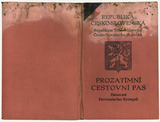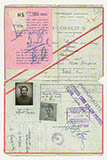Escape routes: the Serpa Pinto
Escape routes: the Serpa Pinto
Nach den Erfahrungen in Frankreich und auf der Reise berührt es uns eigenartig, daß bei all diesen Amtsprozeduren die Menschen, die in ihren Pässen den Vermerk ‚refugiado antifascista’, antifaschistischer Flüchtling, tragen, als besonders willkommene Gäste des Landes betrachtet werden. Noch auf dem Schiff erhalten wir Früchte, Zigaretten und Zeitungen.
[After the experiences in France and while travelling, we find it strangely touching that with all these official procedures, people who carry the note 'refugiado antifascista' - antifascist refugee - in their passports, are considered particularly welcome guests to the country. Still on board ship we receive fruit, cigarettes and newspapers. (ed. trans.)]
Lenka Reiner, German-language writer from Prague, December 1941
In May 1940, the Portuguese shipping company Companhia Colonial de Navegacão sent its newly acquired, renovated and converted steamer Serpa Pinto on its maiden voyage. The vessel had originally been built in Belfast in 1914 and had in the meantime been used for a multitude of purposes. During World War II the Serpa Pinto, flying under the neutral Portuguese flag, undertook many transatlantic journeys taking on which German Nazi sympathisers in Latin America got back to Europe.By the same route, but the other way around, thousands of mostly Jewish refugees succeeded in fleeing overseas from Lisbon and Casablanca.They were often supported in doing so by aid organisations like HICEM, a coalition of American, British and German emigrants' associations, which had had its office in the Portuguese capital since 1940.
Among others, the expressionist writer Ivan Heilbutt as well as the communist publicists Walter Janka and Charlotte Janka, Georg Stibi and Alexander Abusch reached their exile in Mexico on board the Serpa Pinto. French intellectuals like Simone Weil and Marcel Duchamp also left the European mainland using this vessel. Under the command of captain Américo dos Santos, it only scarcely managed to avoid being sunk on several occasions. From autumn 1941 Jews were banned from emigrating from areas under German control, and so subsequently only very few refugees succeeded in embarking for overseas from foreign harbours. From then on, the Serpa Pinto was mainly used for the exchange of nationals between states involved in the war.
Further reading:
Dijn, Rosine De: Das Schicksalsschiff. Rio de Janeiro – Lissabon – New York 1942. München: Deutsche Verlags-Anstalt 2009
Kießling, Wolfgang: Exil in Lateinamerika. Leipzig: Philipp Reclam 1980
Mühlen, Patrick von zur: Fluchtweg Spanien – Portugal. Die deutsche Emigration und der Exodus aus Europa 1933 – 1945. Bonn: Dietz 1992



